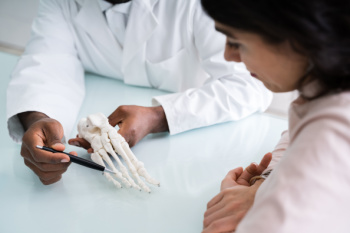Items filtered by date: March 2024
Minimally Invasive Foot Surgery for Bunions

Minimally invasive foot surgery, known as MIS, involves performing surgical procedures with smaller incisions and specialized instruments, often utilizing advanced imaging technology for precision. This approach reduces tissue damage, postoperative pain, and recovery time compared to traditional open surgery. For bunions, MIS techniques focus on correcting the bony deformity at the base of the big toe with minimal disruption to surrounding tissues. Podiatric surgeons may use small incisions to access and realign the bones, remove excess bone or tissue, and stabilize the joint with screws or other fixation devices. MIS for bunions offers several advantages over open surgery, including faster recovery, reduced risk of complications like infection and scarring, and less postoperative pain. It is particularly suitable for mild to moderate bunions with minimal joint involvement and flexible deformities. However, severe bunions or those requiring extensive bone correction may still require traditional open surgery for optimal outcomes. If you have discomfort from a bunion, it is suggested that you make an appointment with a podiatrist to discuss whether surgery might be a good option for you.
Foot surgery is sometimes necessary to treat a foot ailment. To learn more, contact one of our podiatrists of Advanced Foot & Ankle Care Centers. Our doctors will assist you with all of your foot and ankle needs.
When Is Surgery Necessary?
Foot and ankle surgery is generally reserved for cases in which less invasive, conservative procedures have failed to alleviate the problem. Some of the cases in which surgery may be necessary include:
- Removing foot deformities like bunions and bone spurs
- Severe arthritis that has caused bone issues
- Cosmetic reconstruction
What Types of Surgery Are There?
The type of surgery you receive will depend on the nature of the problem you have. Some of the possible surgeries include:
- Bunionectomy for painful bunions
- Surgical fusion for realignment of bones
- Neuropathy decompression surgery to treat nerve damage
Benefits of Surgery
Although surgery is usually a last resort, it can provide more complete pain relief compared to non-surgical methods and may allow you to finally resume full activity.
Surgical techniques have also become increasingly sophisticated. Techniques like endoscopic surgery allow for smaller incisions and faster recovery times.
If you have any questions please feel free to contact our offices located in Nashville, Smyrna, Spring Hill, Columbia, Dickson, Fairview, Hohenwald, TN and the Middle Tennessee community . We offer the newest diagnostic and treatment technologies for all your foot and ankle needs.
Signs and Symptoms of Foot Neuropathy

Foot neuropathy, a common complication of various medical conditions such as diabetes, refers to nerve damage that affects sensation and function in the feet. One of the primary indicators of foot neuropathy is tingling or burning sensations in the feet, often accompanied by numbness or loss of feeling. This diminished sensation increases the risk of injury and can lead to unnoticed wounds or ulcers. Additionally, individuals with foot neuropathy may experience sharp or shooting pains, especially during movement or when pressure is applied to the affected areas. Muscle weakness and difficulty coordinating movements are also common symptoms, making it challenging to walk or perform routine tasks. Recognizing these signs early is essential for timely intervention and management to prevent complications. If you have any of the above symptoms, it is suggested that you are under the care of a podiatrist who can offer you relief and management tips.
Neuropathy
Neuropathy can be a potentially serious condition, especially if it is left undiagnosed. If you have any concerns that you may be experiencing nerve loss in your feet, consult with one of our podiatrists from Advanced Foot & Ankle Care Centers. Our doctors will assess your condition and provide you with quality foot and ankle treatment for neuropathy.
What Is Neuropathy?
Neuropathy is a condition that leads to damage to the nerves in the body. Peripheral neuropathy, or neuropathy that affects your peripheral nervous system, usually occurs in the feet. Neuropathy can be triggered by a number of different causes. Such causes include diabetes, infections, cancers, disorders, and toxic substances.
Symptoms of Neuropathy Include:
- Numbness
- Sensation loss
- Prickling and tingling sensations
- Throbbing, freezing, burning pains
- Muscle weakness
Those with diabetes are at serious risk due to being unable to feel an ulcer on their feet. Diabetics usually also suffer from poor blood circulation. This can lead to the wound not healing, infections occurring, and the limb may have to be amputated.
Treatment
To treat neuropathy in the foot, podiatrists will first diagnose the cause of the neuropathy. Figuring out the underlying cause of the neuropathy will allow the podiatrist to prescribe the best treatment, whether it be caused by diabetes, toxic substance exposure, infection, etc. If the nerve has not died, then it’s possible that sensation may be able to return to the foot.
Pain medication may be issued for pain. Electrical nerve stimulation can be used to stimulate nerves. If the neuropathy is caused from pressure on the nerves, then surgery may be necessary.
If you have any questions, please feel free to contact our offices located in Nashville, Smyrna, Spring Hill, Columbia, Dickson, Fairview, Hohenwald, TN and the Middle Tennessee community . We offer the newest diagnostic and treatment technologies for all your foot care needs.
See Your Podiatrist Regularly If You Work On Your Feet
The Importance of Podiatrists on Healthcare Teams

Podiatrists specialize in diagnosing and treating conditions related to the foot, ankle, and lower leg. Podiatrists play an important role on a healthcare team, as their specialty can help patients maintain and enhance mobility and overall quality of life. Podiatrists’ specialized knowledge of foot-related disorders ranges from common issues, such as ingrown toenails and bunions, to more complex conditions like diabetic foot and structural abnormalities. Podiatrists take a comprehensive approach to treatment, by conducting thorough assessments, implementing various treatment methodologies, and creating personalized care plans. Podiatrists not only address acute and chronic pain but also offer prevention techniques for various conditions. This is important care to receive for conditions that could result in mobility restrictions or more invasive treatments. Overall, podiatrists ensure that our feet, which bear the brunt of our daily activities, receive the specialized care necessary to keep us walking and running through life. If you’re experiencing any foot or ankle-related issues, it is suggested you add a podiatrist to your healthcare team.
If you are dealing with pain in your feet and ankles, you may want to seek help from a podiatrist. Feel free to contact one of our podiatrists from Advanced Foot & Ankle Care Centers. Our doctors can provide the care you need to keep you pain-free and on your feet.
What Is a Podiatrist?
A podiatrist is a doctor of podiatric medicine who diagnoses and treats conditions of the foot, ankle, and related structures of the leg. Your podiatrist may specialize in a certain field such as sports medicine, wound care, pediatrics, and diabetic care. Podiatrists have the ability to become board certified through training, clinical experience, and then taking an exam.
What Do Podiatrists Do?
On a daily basis, a podiatrist may perform the following activities:
- Diagnose foot ailments such as ulcers, tumors, fractures, etc.
- Use innovative methods to treat conditions
- Use corrective orthotics, casts, and strappings to correct deformities
- Correct walking patterns and balance
- Provide individual consultations to patients
It is very important that you take care of your feet. It’s easy to take having healthy feet for granted, however foot problems tend to be among the most common health conditions. Podiatrists can help diagnose and treat a variety of feet related conditions, so it is crucial that you visit one if you need assistance.
If you have any questions please feel free to contact our offices located in Nashville, Smyrna, Spring Hill, Columbia, Dickson, Fairview, Hohenwald, TN and the Middle Tennessee community . We offer the newest diagnostic and treatment technologies for all your foot and ankle needs.
Causes of Forefoot Pain

The forefoot consists of various bones, ligaments, tendons, muscles, nerves, and blood vessels, any of which can experience pain. Three main conditions are contributors to forefoot pain. First is metatarsalgia, or discomfort in the ball of the foot. This condition is often triggered by intense athletic training or wearing ill fitting shoes, causing misalignment of bones or spending too much time on the feet. Second, sesamoiditis results from inflammation of tendons that support the two small sesamoid bones, just under the big toe. Inflammation affects weight bearing and inhibits movement of the big toe. Sesamoiditis is common among runners and dancers. Third is Morton’s neuroma, characterized by a thickening of the tissue surrounding the nerves near the toes. This causes burning pain and numbness, and is generally felt between the third and fourth toes. It can worsen by wearing inappropriate footwear or participating in high-impact activities. For advice with any of these painful forefoot ailments, it is suggested that you schedule an appointment with a podiatrist for an accurate diagnosis and tailored treatment plans.
Foot Pain
Foot pain can be extremely painful and debilitating. If you have a foot pain, consult with one of our podiatrists from Advanced Foot & Ankle Care Centers. Our doctors will assess your condition and provide you with quality foot and ankle treatment.
Causes
Foot pain is a very broad condition that could be caused by one or more ailments. The most common include:
- Bunions
- Hammertoes
- Plantar Fasciitis
- Bone Spurs
- Corns
- Tarsal Tunnel Syndrome
- Ingrown Toenails
- Arthritis (such as Gout, Rheumatoid, and Osteoarthritis)
- Flat Feet
- Injury (from stress fractures, broken toe, foot, ankle, Achilles tendon ruptures, and sprains)
- And more
Diagnosis
To figure out the cause of foot pain, podiatrists utilize several different methods. This can range from simple visual inspections and sensation tests to X-rays and MRI scans. Prior medical history, family medical history, and any recent physical traumatic events will all be taken into consideration for a proper diagnosis.
Treatment
Treatment depends upon the cause of the foot pain. Whether it is resting, staying off the foot, or having surgery; podiatrists have a number of treatment options available for foot pain.
If you have any questions, please feel free to contact our offices located in Nashville, Smyrna, Spring Hill, Columbia, Dickson, Fairview, Hohenwald, TN and the Middle Tennessee community . We offer the newest diagnostic and treatment technologies for all your foot care needs.


